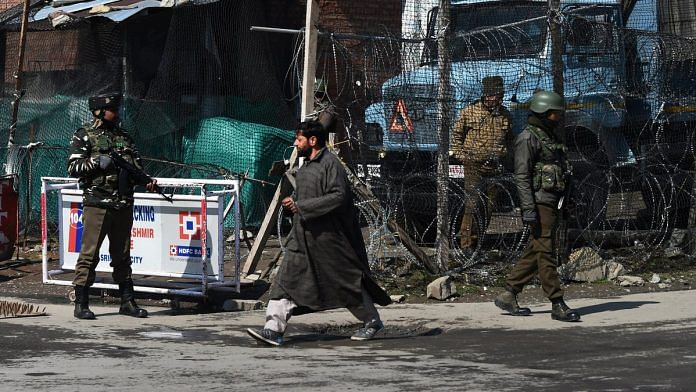Al Qaeda’s saga of failure in India
Ajai Sahni | Executive director, Institute for Conflict Management & South Asia Terrorism Portal; editor and publisher, Faultlines: The KPS Gill Journal of Conflict & Resolution
Hindustan Times
In this piece, Sahni talks about the latest call by Ayman al Zawahiri — the current chief of Al Qaeda — for jihad in Kashmir. Sahni argues that while all threats need to be taken seriously, one should also not forget that “the dangers and consequences of overestimation — and potential overreaction — are just as great”. He writes Zawahiri’s statements can easily be used in a kind of politics that seeks to demonise all Kashmiris as sympathetic to a global jihadist movement.
He adds that all such previous attempts to make Kashmir a part of some global jihadist movement have largely not succeeded. He cites how Al Qaeda in the Indian Sub-continent (AQIS), formed in 2014, has not received any traction on Indian soil. He also observes that Al Qaeda presently is on a declining path globally.
Sahni notes that Islamic terrorism in Jammu and Kashmir, and other parts of India, succeeds only when it is supported by the Pakistani state.
Delhi to Tehran via US
Christophe Jaffrelot | Senior research fellow at CERI-Sciences Po/CNRS, Paris, professor of Indian Politics and Sociology at King’s India Institute, London
Vihang Jumle | Associate at Ikigai Law, New Delhi
The Indian Express
Jaffrelot and Jumle argue that US, under Donald Trump’s leadership, has derailed two important pillars of India’s foreign policy — Iran and Afghanistan. They write India could not resist the US pressure of an oil import ban from Iran, and has also come to understand the limited utility of the Chabahar port if shippers and cargo handlers stay away from it due to US sanctions.
Similarly, they say that India has made huge investments in Afghanistan, and also supported the civilian governments of Hamid Karzai and Ashraf Ghani. This provided India an insurance for all its investments made in the country, and also accorded it an opportunity to reach out to other Central Asian countries. But Trump administration’s intensification of its negotiations with the Taliban to expedite US withdrawal from the country has put India in a difficult situation, they write.
A welcome debate on electoral reforms
S.Y. Quraishi | Former Chief Election Commissioner of India and the author of ‘An Undocumented Wonder — the Making of the Great Indian Election’
The Hindu
Quraishi talks about a discussion on electoral reforms, which took place in the Rajya Sabha on 3 July. He mentions that the discussion revolved around six themes — “appointment system for Election Commissioners and Chief Election Commissioner (CEC); money power; Electronic Voting Machines (EVMs); the idea of simultaneous elections; the role of social media…and lastly, the use of government data and surrogate advertisements to target certain sections of voters”.
He says he has long been an advocate of some of the reforms, which were suggested in the discussion. This includes reducing the number of phases in elections, depoliticisation of constitutional appointments through a collegium system, state funding of parties and putting a cap on their expenditure, among others.
While hailing the discussion, he exhorts parties to now take a step ahead and legislate on these issues.
Hong Kong wages a lonely battle
Harsh V Pant | Professor of International Relations, King’s College London
The Telegraph
Pant discusses the present situation in Hong Kong and how China’s hold over the territory has significantly increased over the years. Protests erupted in Hong Kong when China introduced a Bill that would have allowed it to extradite people from Hong Kong to the mainland. The protesters want a complete withdrawal of the bill.
Pant writes it is China that now decides who will govern Hong Kong, and only half of the seats in Hong Kong legislature are now filled by elections. He observes it is unlikely that China will give in to any kind of pressure, and would, in fact, want to send out the signal that “challenging Beijing will entail significant costs”.
He notes the international community is unlikely to do much as it is more interested in making money from the Chinese economy. “Hongkongers will have to fight their own battles against one of the mightiest nations of our time,” writes Pant.
Budget: Managing the fisc while enlarging the growth deficit
Deepak Nayyar | Emeritus professor of cconomics, Jawaharlal Nehru University
Mint
Nayyar writes on how the Budget did not give sufficient recognition or attention to the problems facing the economy. He says the Budget has done little to revive growth or investment and exports, which are important drivers of economic growth and employment creation.
He says the Budget could have taken steps to revive growth from the demand side through public investment by increasing government expenditure.
He writes how the first Budget of the government was a missed opportunity and how a bolder expansionary Budget, which allowed 0.5 per cent higher fiscal deficit, would have helped in fostering growth. Obsessive concerns about a fiscal deficit may lead to a growth deficit.
Tax burden: India’s investment trust deficit
Siddarth Pai | Founding partner of 3one4 Capital
Vishak Nathan | Founder of Suvitta Capital
Financial Express
They write on the Budget proposal to tax the super-rich and how this proposal has been extended to trusts and all association of persons.
Many foreign portfolio investors consist of insurance and pension funds and they are incorporated as trusts. They point out that the proposal will levy a much higher tax on these trusts and ignore their pass through status. The impact of this proposal on investor sentiment is visible, they write, adding that India cannot roll out red carpet for investors and then bolt the door and shake them.






